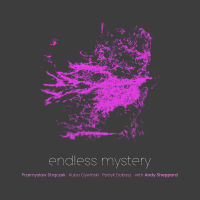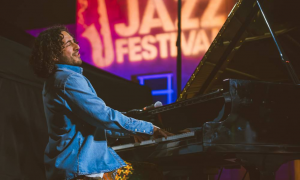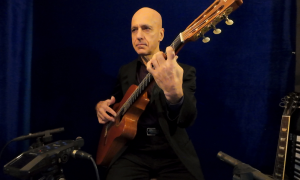
Robert Randolph- - pedal steel guitar, vocals
Danyel Morgan- - bass guitar, vocals
Marcus Randolph- - drums
John Ginty- - Hammond organ
Spirit. Rapture. Soul. Inspiration. These are terms often associated with church music, and they come alive full force on Live At The Wetlands, the hard-rocking Dare Records debut by pedal steel guitar phenomenon Robert Randolph & The Family Band. It's no accident that this stunning concert recording, cut in August 2001 at the fabled, now-defunct New York club, exhibits the fervor and heat of a down-home meeting. 24-year-old Randolph's blazing steel guitar sound draws its dizzying effect from its roots in the church, where the precocious musician learned to play his instrument.
A New Jersey native, Randolph grew up attending the House Of God Church in Orange, where his father was a deacon and his mother a minister. This denomination of the Pentecostal Church has a unique, 60-year tradition of musical services (documented on Arhoolie Records' long-running and revelatory series of Sacred Steel albums) that began because steel guitars were Inexpensive stand-ins for pipe organs. Randolph was drawn to its unique qualities from a very young age. “There's a long history of guys playing at my church, playing lap steels and pedal steels throughout the years," Randolph says. “It's one instrument that you would always see people play there, so I just felt like playing it. I wanted to get into it, because of the voicings."
Randolph began playing the steel guitar at the age of 16 in 1994, when Chuck Campbell, pedal steel player in the Sacred Steel unit the Campbell Brothers, bought him a $60 six-string lap steel model. Growing up in the poor neighborhood of Irvington, NJ, Randolph quite seriously credits the instrument with saving his life. He told the New York Times: “The more I'd get into playing, the more I'd hear that this friend or that friend was jumped or put in jail or shot. And the more I heard things like that, the more I wanted to stay in my house and play the pedal steel." And play he did, hours straight, days straight. As a result, the young performer soon graduated to a 10-string pedal steel guitar, and then to the challenging 13-string pedal model he now plays.
 Randolph cites such sacred steel players as Ted Beard, Calvin Cooke, Glenn Lee, Andy and Omar Mimms, and Buddy Boy Snelling as formative influences. He recalls, “I would always talk to people in the church to find out how they went about playing and how they tuned their guitars. I would basically call all the church guys up and try and get different stuff from them, take different pointers, find out how to play songs." It wasn't long before Randolph was himself making roof-raising appearances at New Jersey House of God services. He was often accompanied by his cousins, bassist Danyel Morgan (himself a gifted steel player from the age of 15) and drummer Marcus Randolph, who would become the core of the Family Band.
Randolph cites such sacred steel players as Ted Beard, Calvin Cooke, Glenn Lee, Andy and Omar Mimms, and Buddy Boy Snelling as formative influences. He recalls, “I would always talk to people in the church to find out how they went about playing and how they tuned their guitars. I would basically call all the church guys up and try and get different stuff from them, take different pointers, find out how to play songs." It wasn't long before Randolph was himself making roof-raising appearances at New Jersey House of God services. He was often accompanied by his cousins, bassist Danyel Morgan (himself a gifted steel player from the age of 15) and drummer Marcus Randolph, who would become the core of the Family Band.
Randolph's “new look" steel style made its recorded bow on Sacred Steel - Live!, a 1999 Arhoolie collection. He can also be heard performing “I Feel Like Pressing My Way" -- a hymn movingly adapted on Live At The Wetlands as “Pressing My Way" - on the 2001 Arhoolie set Train Don't Leave Me, captured in the spring of 2000 at the first annual Sacred Steel Convention at Rollins College in Winter Park, Fl.
As Randolph was establishing himself as a rising luminary in the Sacred Steel world, the only music he was listening to was church music, contemporary R&B and hip-hop, but a major artistic turning point was soon to arrive. “In about 1998, a guy from my church gave me a tape of Stevie Ray Vaughan. That's what really turned the light switch on. 'Man, I gotta try to play the pedal steel guitar like this guy' I had never heard of him. I was like, 'Oh, man!'"
By September of 2000, The Family Band lineup, which now included Hammond organist John Ginty, was solidified and ready to take its anointed sound beyond the pews. Randolph explains, “Great music is great music, and people latch onto it regardless of where it's at or how it's being played. The goal was to get it out. I knew it would have the same effect on the people in the rock and blues scenes as it did on the parishioners in the church."
Although Randolph recognized that his move from the church to the rock concert hall would be viewed as controversial in some religious quarters, he was determined to follow his dream. “A lot of the guys from the church can't leave and go out there and play because of the church rules," he explains. “They can't go out and play clubs. They hold offices in the church. Most of the ministers will tell you that it's wrong. But I'm doing it basically for the instrument. So many people don't know what pedal steel is and what you can do with it. It's been hidden for so long. I'm trying to get it out there and make it as well-known as possible."
Crushing together church-bred passion and pure rock heat, The Family Band rapidly became the focus of media attention and a quickly burgeoning fan base in the New York City area. The group cut demos with guitarist and club owner Eric “Roscoe" Ambel, and those tapes soon found their way into the hands of the North Mississippi Allstars, who asked The Family Band to open a gig for them at New York's Bowery Ballroom. Also in the house that night was John Medeski, keyboardist for the jazz-inflected trio Medeski, Martin & Wood, who already had the germ of an idea for a gospel-oriented instrumental project. That fateful date led to the recording of Ropeadope Records' The Word, a volcanic in-the-spirit meeting of Randolph, Medeski, and the Allstars' Luther and Cody Dickinson and Chris Chew. The quintet's stomping, hard-driving reading of traditional gospel standards and puissant originals represented another expansion of the Sacred Steel lexicon, and led to two hotly received U.S. tours. Comparing the Family Band with this side aggregation, Randolph says, “They are very much related, with that gospel background and that energy." Live At The Wetlands displays the full measure of The Family Band's live electricity, from the nuclear energy of “Ted's Jam" and “I Don't Know What You Come to Do" to the soaring blues of Slim Harpo's “Shake Your Hips" and the devout soulfulness of “Pressing My Way." Beyond announcing the jubilant arrival of an altogether original and electrifying new band, the album reveals in full flight the astonishing gifts of Robert Randolph, who takes his place alongside today's most accomplished instrumentalists.
Visit http://www.robertrandolph.net for more information.
For more information contact All About Jazz.






















